A Critical Evaluation of Global State Response Procedures to Terrorism
VerifiedAdded on 2023/04/22
|10
|2118
|183
Essay
AI Summary
This essay provides a comprehensive overview of global responses to terrorism, focusing on state procedures and evaluation mechanisms. It begins by outlining the background of the 'war on terror' following the 9/11 attacks and the subsequent adoption of the UN Global Counter-Terrorism Strategy. The essay highlights the importance of a liberal democratic approach in addressing the root causes of terrorism, combining military action with criminal justice. It presents data on terror incidents before and after 9/11, noting the increased prevalence in regions like the Indian Subcontinent and Central Asia. The essay also examines global anti-terror policies implemented by the UN and NATO, including intelligence sharing, security enhancements, and efforts to cut off terror funding. Finally, it delves into the anti-terrorism strategies of Singapore and Australia, emphasizing national security frameworks and proactive measures to counter extremist ideologies and disrupt terror activities. The conclusion stresses the need for a systematic approach, combined with force, to effectively combat terrorism and mitigate its impact on society.
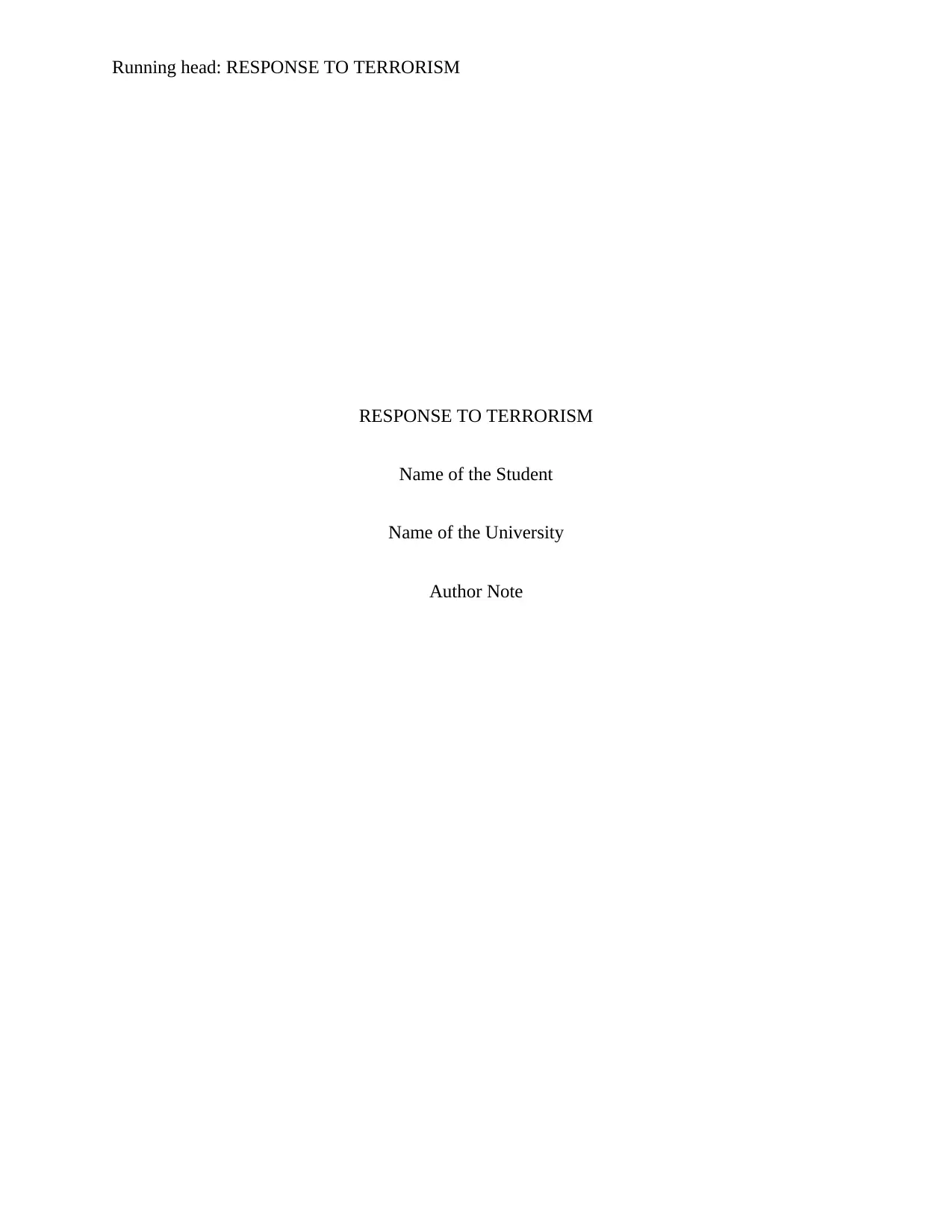
Running head: RESPONSE TO TERRORISM
RESPONSE TO TERRORISM
Name of the Student
Name of the University
Author Note
RESPONSE TO TERRORISM
Name of the Student
Name of the University
Author Note
Paraphrase This Document
Need a fresh take? Get an instant paraphrase of this document with our AI Paraphraser
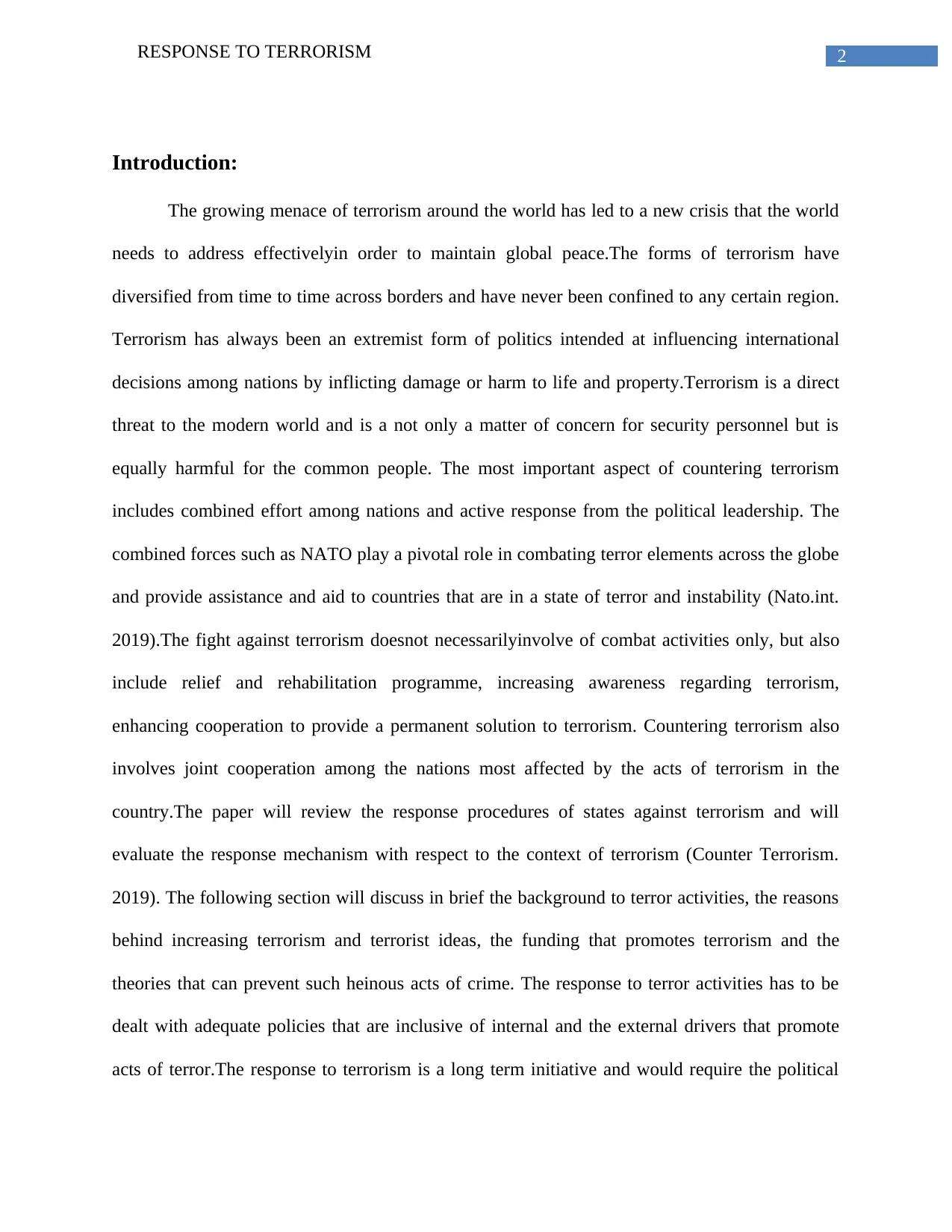
2RESPONSE TO TERRORISM
Introduction:
The growing menace of terrorism around the world has led to a new crisis that the world
needs to address effectivelyin order to maintain global peace.The forms of terrorism have
diversified from time to time across borders and have never been confined to any certain region.
Terrorism has always been an extremist form of politics intended at influencing international
decisions among nations by inflicting damage or harm to life and property.Terrorism is a direct
threat to the modern world and is a not only a matter of concern for security personnel but is
equally harmful for the common people. The most important aspect of countering terrorism
includes combined effort among nations and active response from the political leadership. The
combined forces such as NATO play a pivotal role in combating terror elements across the globe
and provide assistance and aid to countries that are in a state of terror and instability (Nato.int.
2019).The fight against terrorism doesnot necessarilyinvolve of combat activities only, but also
include relief and rehabilitation programme, increasing awareness regarding terrorism,
enhancing cooperation to provide a permanent solution to terrorism. Countering terrorism also
involves joint cooperation among the nations most affected by the acts of terrorism in the
country.The paper will review the response procedures of states against terrorism and will
evaluate the response mechanism with respect to the context of terrorism (Counter Terrorism.
2019). The following section will discuss in brief the background to terror activities, the reasons
behind increasing terrorism and terrorist ideas, the funding that promotes terrorism and the
theories that can prevent such heinous acts of crime. The response to terror activities has to be
dealt with adequate policies that are inclusive of internal and the external drivers that promote
acts of terror.The response to terrorism is a long term initiative and would require the political
Introduction:
The growing menace of terrorism around the world has led to a new crisis that the world
needs to address effectivelyin order to maintain global peace.The forms of terrorism have
diversified from time to time across borders and have never been confined to any certain region.
Terrorism has always been an extremist form of politics intended at influencing international
decisions among nations by inflicting damage or harm to life and property.Terrorism is a direct
threat to the modern world and is a not only a matter of concern for security personnel but is
equally harmful for the common people. The most important aspect of countering terrorism
includes combined effort among nations and active response from the political leadership. The
combined forces such as NATO play a pivotal role in combating terror elements across the globe
and provide assistance and aid to countries that are in a state of terror and instability (Nato.int.
2019).The fight against terrorism doesnot necessarilyinvolve of combat activities only, but also
include relief and rehabilitation programme, increasing awareness regarding terrorism,
enhancing cooperation to provide a permanent solution to terrorism. Countering terrorism also
involves joint cooperation among the nations most affected by the acts of terrorism in the
country.The paper will review the response procedures of states against terrorism and will
evaluate the response mechanism with respect to the context of terrorism (Counter Terrorism.
2019). The following section will discuss in brief the background to terror activities, the reasons
behind increasing terrorism and terrorist ideas, the funding that promotes terrorism and the
theories that can prevent such heinous acts of crime. The response to terror activities has to be
dealt with adequate policies that are inclusive of internal and the external drivers that promote
acts of terror.The response to terrorism is a long term initiative and would require the political
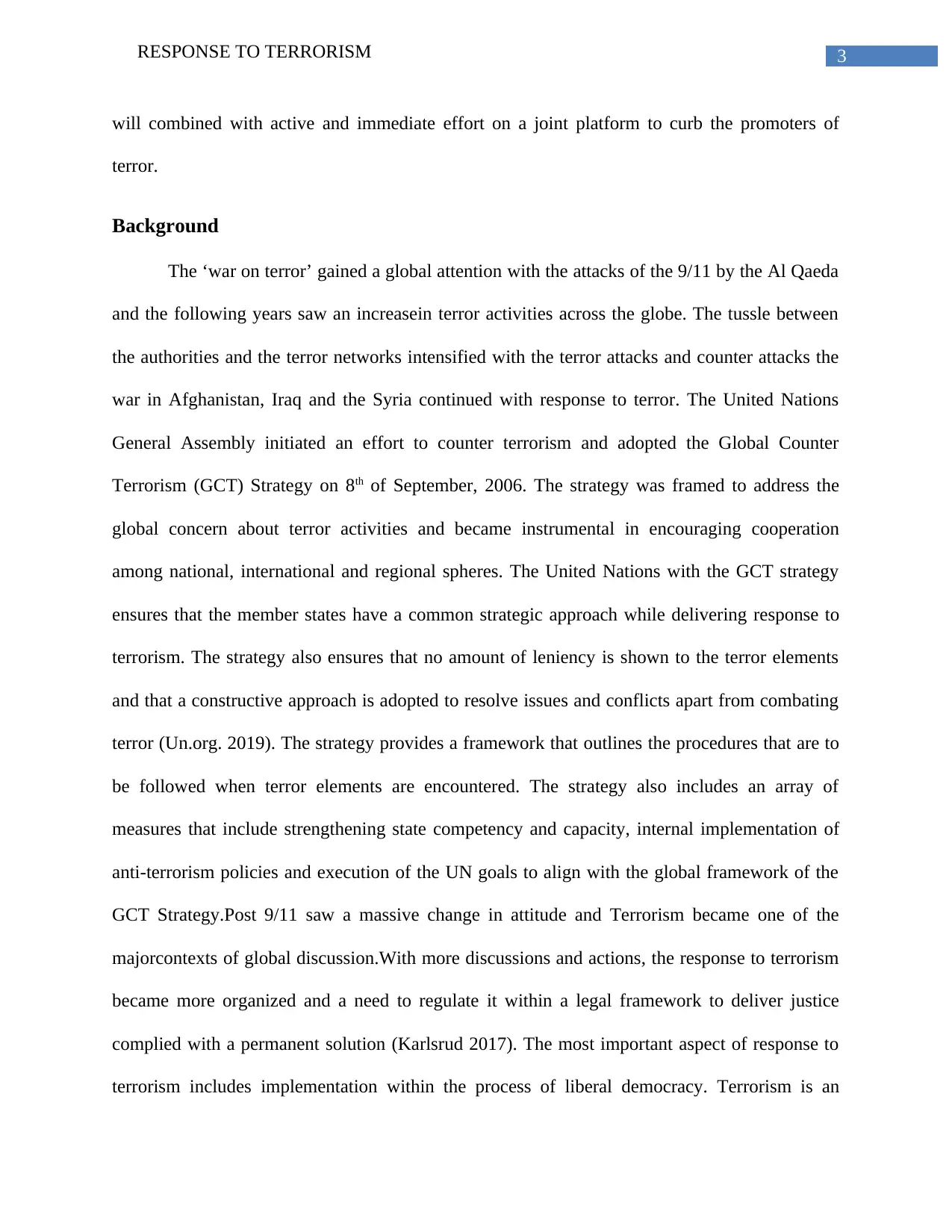
3RESPONSE TO TERRORISM
will combined with active and immediate effort on a joint platform to curb the promoters of
terror.
Background
The ‘war on terror’ gained a global attention with the attacks of the 9/11 by the Al Qaeda
and the following years saw an increasein terror activities across the globe. The tussle between
the authorities and the terror networks intensified with the terror attacks and counter attacks the
war in Afghanistan, Iraq and the Syria continued with response to terror. The United Nations
General Assembly initiated an effort to counter terrorism and adopted the Global Counter
Terrorism (GCT) Strategy on 8th of September, 2006. The strategy was framed to address the
global concern about terror activities and became instrumental in encouraging cooperation
among national, international and regional spheres. The United Nations with the GCT strategy
ensures that the member states have a common strategic approach while delivering response to
terrorism. The strategy also ensures that no amount of leniency is shown to the terror elements
and that a constructive approach is adopted to resolve issues and conflicts apart from combating
terror (Un.org. 2019). The strategy provides a framework that outlines the procedures that are to
be followed when terror elements are encountered. The strategy also includes an array of
measures that include strengthening state competency and capacity, internal implementation of
anti-terrorism policies and execution of the UN goals to align with the global framework of the
GCT Strategy.Post 9/11 saw a massive change in attitude and Terrorism became one of the
majorcontexts of global discussion.With more discussions and actions, the response to terrorism
became more organized and a need to regulate it within a legal framework to deliver justice
complied with a permanent solution (Karlsrud 2017). The most important aspect of response to
terrorism includes implementation within the process of liberal democracy. Terrorism is an
will combined with active and immediate effort on a joint platform to curb the promoters of
terror.
Background
The ‘war on terror’ gained a global attention with the attacks of the 9/11 by the Al Qaeda
and the following years saw an increasein terror activities across the globe. The tussle between
the authorities and the terror networks intensified with the terror attacks and counter attacks the
war in Afghanistan, Iraq and the Syria continued with response to terror. The United Nations
General Assembly initiated an effort to counter terrorism and adopted the Global Counter
Terrorism (GCT) Strategy on 8th of September, 2006. The strategy was framed to address the
global concern about terror activities and became instrumental in encouraging cooperation
among national, international and regional spheres. The United Nations with the GCT strategy
ensures that the member states have a common strategic approach while delivering response to
terrorism. The strategy also ensures that no amount of leniency is shown to the terror elements
and that a constructive approach is adopted to resolve issues and conflicts apart from combating
terror (Un.org. 2019). The strategy provides a framework that outlines the procedures that are to
be followed when terror elements are encountered. The strategy also includes an array of
measures that include strengthening state competency and capacity, internal implementation of
anti-terrorism policies and execution of the UN goals to align with the global framework of the
GCT Strategy.Post 9/11 saw a massive change in attitude and Terrorism became one of the
majorcontexts of global discussion.With more discussions and actions, the response to terrorism
became more organized and a need to regulate it within a legal framework to deliver justice
complied with a permanent solution (Karlsrud 2017). The most important aspect of response to
terrorism includes implementation within the process of liberal democracy. Terrorism is an
⊘ This is a preview!⊘
Do you want full access?
Subscribe today to unlock all pages.

Trusted by 1+ million students worldwide
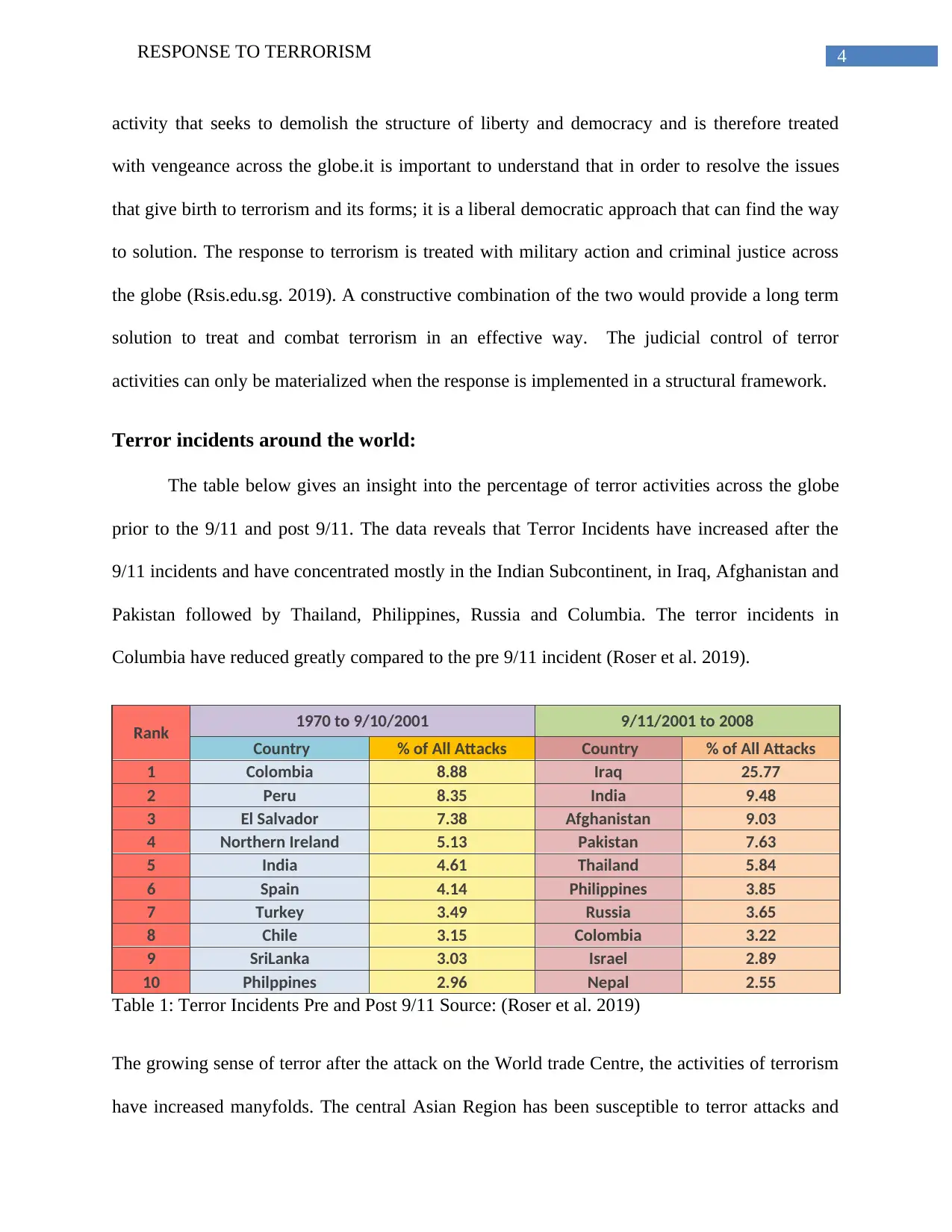
4RESPONSE TO TERRORISM
activity that seeks to demolish the structure of liberty and democracy and is therefore treated
with vengeance across the globe.it is important to understand that in order to resolve the issues
that give birth to terrorism and its forms; it is a liberal democratic approach that can find the way
to solution. The response to terrorism is treated with military action and criminal justice across
the globe (Rsis.edu.sg. 2019). A constructive combination of the two would provide a long term
solution to treat and combat terrorism in an effective way. The judicial control of terror
activities can only be materialized when the response is implemented in a structural framework.
Terror incidents around the world:
The table below gives an insight into the percentage of terror activities across the globe
prior to the 9/11 and post 9/11. The data reveals that Terror Incidents have increased after the
9/11 incidents and have concentrated mostly in the Indian Subcontinent, in Iraq, Afghanistan and
Pakistan followed by Thailand, Philippines, Russia and Columbia. The terror incidents in
Columbia have reduced greatly compared to the pre 9/11 incident (Roser et al. 2019).
Rank 1970 to 9/10/2001 9/11/2001 to 2008
Country % of All Attacks Country % of All Attacks
1 Colombia 8.88 Iraq 25.77
2 Peru 8.35 India 9.48
3 El Salvador 7.38 Afghanistan 9.03
4 Northern Ireland 5.13 Pakistan 7.63
5 India 4.61 Thailand 5.84
6 Spain 4.14 Philippines 3.85
7 Turkey 3.49 Russia 3.65
8 Chile 3.15 Colombia 3.22
9 SriLanka 3.03 Israel 2.89
10 Philppines 2.96 Nepal 2.55
Table 1: Terror Incidents Pre and Post 9/11 Source: (Roser et al. 2019)
The growing sense of terror after the attack on the World trade Centre, the activities of terrorism
have increased manyfolds. The central Asian Region has been susceptible to terror attacks and
activity that seeks to demolish the structure of liberty and democracy and is therefore treated
with vengeance across the globe.it is important to understand that in order to resolve the issues
that give birth to terrorism and its forms; it is a liberal democratic approach that can find the way
to solution. The response to terrorism is treated with military action and criminal justice across
the globe (Rsis.edu.sg. 2019). A constructive combination of the two would provide a long term
solution to treat and combat terrorism in an effective way. The judicial control of terror
activities can only be materialized when the response is implemented in a structural framework.
Terror incidents around the world:
The table below gives an insight into the percentage of terror activities across the globe
prior to the 9/11 and post 9/11. The data reveals that Terror Incidents have increased after the
9/11 incidents and have concentrated mostly in the Indian Subcontinent, in Iraq, Afghanistan and
Pakistan followed by Thailand, Philippines, Russia and Columbia. The terror incidents in
Columbia have reduced greatly compared to the pre 9/11 incident (Roser et al. 2019).
Rank 1970 to 9/10/2001 9/11/2001 to 2008
Country % of All Attacks Country % of All Attacks
1 Colombia 8.88 Iraq 25.77
2 Peru 8.35 India 9.48
3 El Salvador 7.38 Afghanistan 9.03
4 Northern Ireland 5.13 Pakistan 7.63
5 India 4.61 Thailand 5.84
6 Spain 4.14 Philippines 3.85
7 Turkey 3.49 Russia 3.65
8 Chile 3.15 Colombia 3.22
9 SriLanka 3.03 Israel 2.89
10 Philppines 2.96 Nepal 2.55
Table 1: Terror Incidents Pre and Post 9/11 Source: (Roser et al. 2019)
The growing sense of terror after the attack on the World trade Centre, the activities of terrorism
have increased manyfolds. The central Asian Region has been susceptible to terror attacks and
Paraphrase This Document
Need a fresh take? Get an instant paraphrase of this document with our AI Paraphraser
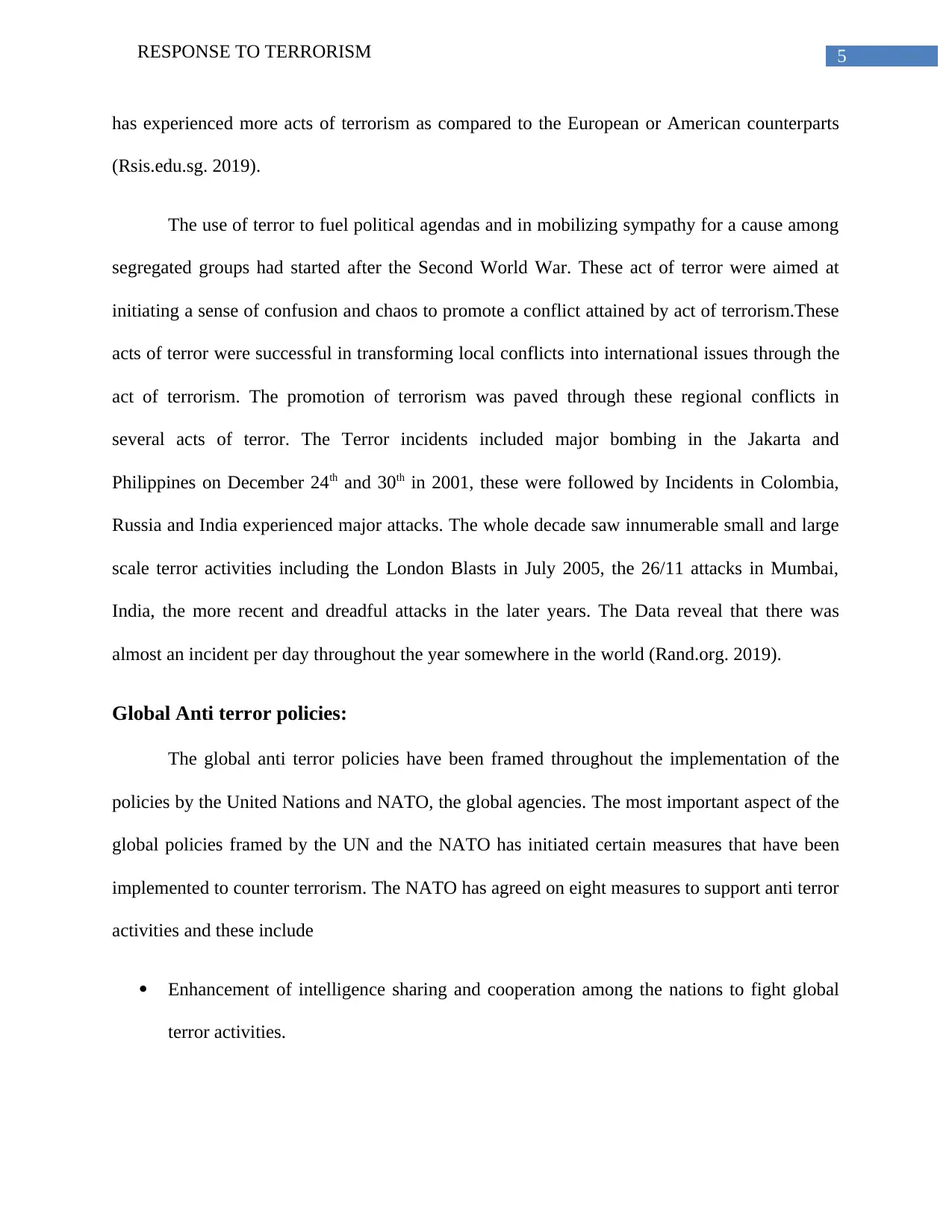
5RESPONSE TO TERRORISM
has experienced more acts of terrorism as compared to the European or American counterparts
(Rsis.edu.sg. 2019).
The use of terror to fuel political agendas and in mobilizing sympathy for a cause among
segregated groups had started after the Second World War. These act of terror were aimed at
initiating a sense of confusion and chaos to promote a conflict attained by act of terrorism.These
acts of terror were successful in transforming local conflicts into international issues through the
act of terrorism. The promotion of terrorism was paved through these regional conflicts in
several acts of terror. The Terror incidents included major bombing in the Jakarta and
Philippines on December 24th and 30th in 2001, these were followed by Incidents in Colombia,
Russia and India experienced major attacks. The whole decade saw innumerable small and large
scale terror activities including the London Blasts in July 2005, the 26/11 attacks in Mumbai,
India, the more recent and dreadful attacks in the later years. The Data reveal that there was
almost an incident per day throughout the year somewhere in the world (Rand.org. 2019).
Global Anti terror policies:
The global anti terror policies have been framed throughout the implementation of the
policies by the United Nations and NATO, the global agencies. The most important aspect of the
global policies framed by the UN and the NATO has initiated certain measures that have been
implemented to counter terrorism. The NATO has agreed on eight measures to support anti terror
activities and these include
Enhancement of intelligence sharing and cooperation among the nations to fight global
terror activities.
has experienced more acts of terrorism as compared to the European or American counterparts
(Rsis.edu.sg. 2019).
The use of terror to fuel political agendas and in mobilizing sympathy for a cause among
segregated groups had started after the Second World War. These act of terror were aimed at
initiating a sense of confusion and chaos to promote a conflict attained by act of terrorism.These
acts of terror were successful in transforming local conflicts into international issues through the
act of terrorism. The promotion of terrorism was paved through these regional conflicts in
several acts of terror. The Terror incidents included major bombing in the Jakarta and
Philippines on December 24th and 30th in 2001, these were followed by Incidents in Colombia,
Russia and India experienced major attacks. The whole decade saw innumerable small and large
scale terror activities including the London Blasts in July 2005, the 26/11 attacks in Mumbai,
India, the more recent and dreadful attacks in the later years. The Data reveal that there was
almost an incident per day throughout the year somewhere in the world (Rand.org. 2019).
Global Anti terror policies:
The global anti terror policies have been framed throughout the implementation of the
policies by the United Nations and NATO, the global agencies. The most important aspect of the
global policies framed by the UN and the NATO has initiated certain measures that have been
implemented to counter terrorism. The NATO has agreed on eight measures to support anti terror
activities and these include
Enhancement of intelligence sharing and cooperation among the nations to fight global
terror activities.
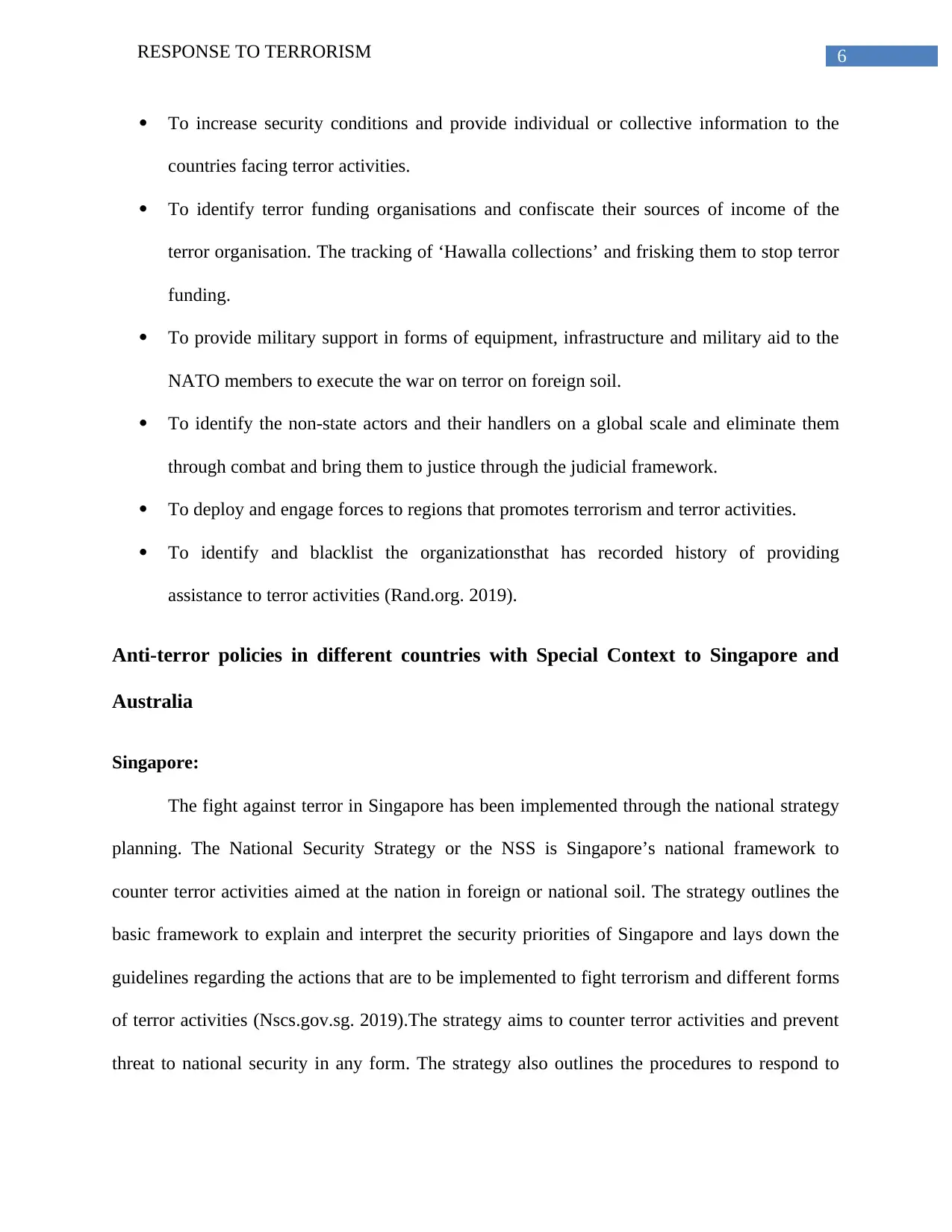
6RESPONSE TO TERRORISM
To increase security conditions and provide individual or collective information to the
countries facing terror activities.
To identify terror funding organisations and confiscate their sources of income of the
terror organisation. The tracking of ‘Hawalla collections’ and frisking them to stop terror
funding.
To provide military support in forms of equipment, infrastructure and military aid to the
NATO members to execute the war on terror on foreign soil.
To identify the non-state actors and their handlers on a global scale and eliminate them
through combat and bring them to justice through the judicial framework.
To deploy and engage forces to regions that promotes terrorism and terror activities.
To identify and blacklist the organizationsthat has recorded history of providing
assistance to terror activities (Rand.org. 2019).
Anti-terror policies in different countries with Special Context to Singapore and
Australia
Singapore:
The fight against terror in Singapore has been implemented through the national strategy
planning. The National Security Strategy or the NSS is Singapore’s national framework to
counter terror activities aimed at the nation in foreign or national soil. The strategy outlines the
basic framework to explain and interpret the security priorities of Singapore and lays down the
guidelines regarding the actions that are to be implemented to fight terrorism and different forms
of terror activities (Nscs.gov.sg. 2019).The strategy aims to counter terror activities and prevent
threat to national security in any form. The strategy also outlines the procedures to respond to
To increase security conditions and provide individual or collective information to the
countries facing terror activities.
To identify terror funding organisations and confiscate their sources of income of the
terror organisation. The tracking of ‘Hawalla collections’ and frisking them to stop terror
funding.
To provide military support in forms of equipment, infrastructure and military aid to the
NATO members to execute the war on terror on foreign soil.
To identify the non-state actors and their handlers on a global scale and eliminate them
through combat and bring them to justice through the judicial framework.
To deploy and engage forces to regions that promotes terrorism and terror activities.
To identify and blacklist the organizationsthat has recorded history of providing
assistance to terror activities (Rand.org. 2019).
Anti-terror policies in different countries with Special Context to Singapore and
Australia
Singapore:
The fight against terror in Singapore has been implemented through the national strategy
planning. The National Security Strategy or the NSS is Singapore’s national framework to
counter terror activities aimed at the nation in foreign or national soil. The strategy outlines the
basic framework to explain and interpret the security priorities of Singapore and lays down the
guidelines regarding the actions that are to be implemented to fight terrorism and different forms
of terror activities (Nscs.gov.sg. 2019).The strategy aims to counter terror activities and prevent
threat to national security in any form. The strategy also outlines the procedures to respond to
⊘ This is a preview!⊘
Do you want full access?
Subscribe today to unlock all pages.

Trusted by 1+ million students worldwide
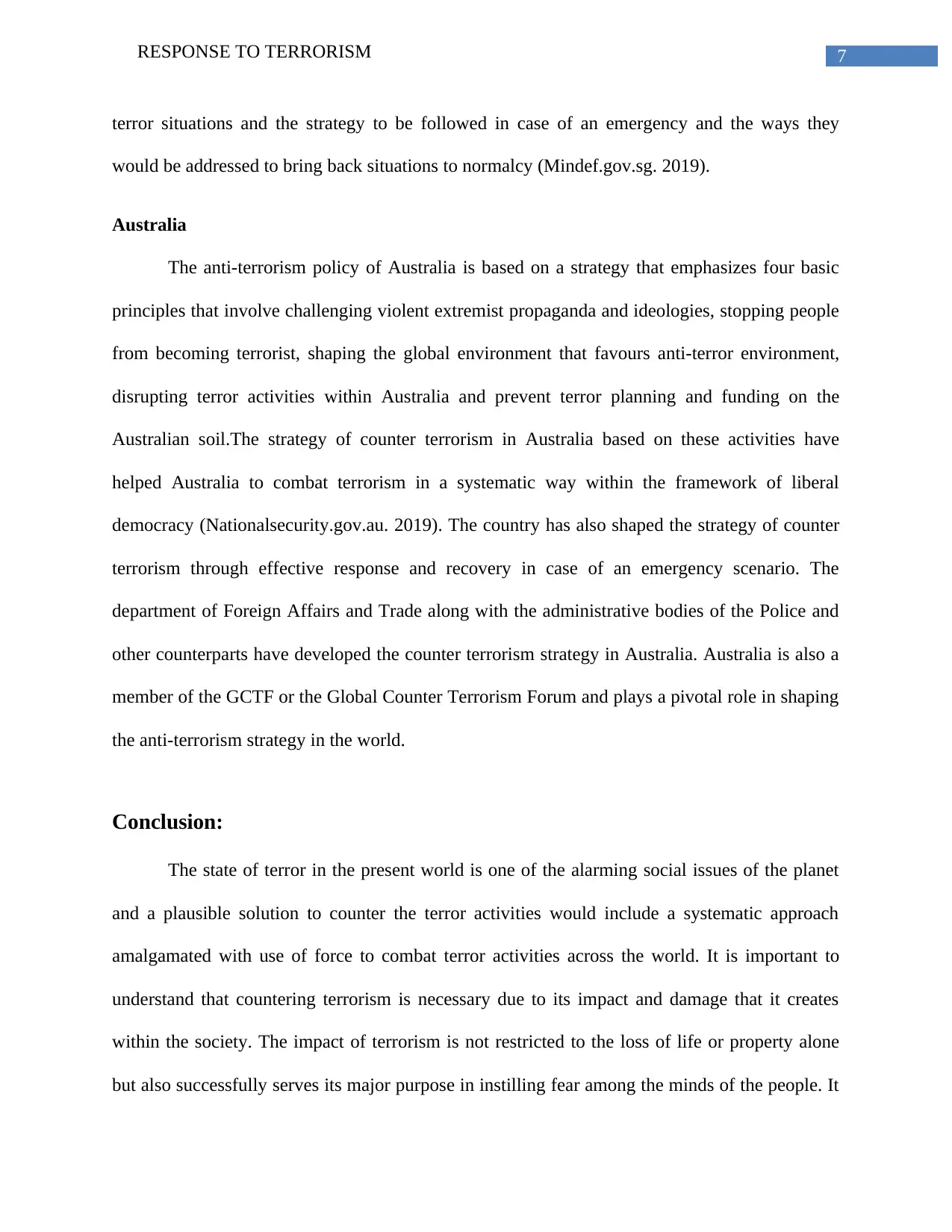
7RESPONSE TO TERRORISM
terror situations and the strategy to be followed in case of an emergency and the ways they
would be addressed to bring back situations to normalcy (Mindef.gov.sg. 2019).
Australia
The anti-terrorism policy of Australia is based on a strategy that emphasizes four basic
principles that involve challenging violent extremist propaganda and ideologies, stopping people
from becoming terrorist, shaping the global environment that favours anti-terror environment,
disrupting terror activities within Australia and prevent terror planning and funding on the
Australian soil.The strategy of counter terrorism in Australia based on these activities have
helped Australia to combat terrorism in a systematic way within the framework of liberal
democracy (Nationalsecurity.gov.au. 2019). The country has also shaped the strategy of counter
terrorism through effective response and recovery in case of an emergency scenario. The
department of Foreign Affairs and Trade along with the administrative bodies of the Police and
other counterparts have developed the counter terrorism strategy in Australia. Australia is also a
member of the GCTF or the Global Counter Terrorism Forum and plays a pivotal role in shaping
the anti-terrorism strategy in the world.
Conclusion:
The state of terror in the present world is one of the alarming social issues of the planet
and a plausible solution to counter the terror activities would include a systematic approach
amalgamated with use of force to combat terror activities across the world. It is important to
understand that countering terrorism is necessary due to its impact and damage that it creates
within the society. The impact of terrorism is not restricted to the loss of life or property alone
but also successfully serves its major purpose in instilling fear among the minds of the people. It
terror situations and the strategy to be followed in case of an emergency and the ways they
would be addressed to bring back situations to normalcy (Mindef.gov.sg. 2019).
Australia
The anti-terrorism policy of Australia is based on a strategy that emphasizes four basic
principles that involve challenging violent extremist propaganda and ideologies, stopping people
from becoming terrorist, shaping the global environment that favours anti-terror environment,
disrupting terror activities within Australia and prevent terror planning and funding on the
Australian soil.The strategy of counter terrorism in Australia based on these activities have
helped Australia to combat terrorism in a systematic way within the framework of liberal
democracy (Nationalsecurity.gov.au. 2019). The country has also shaped the strategy of counter
terrorism through effective response and recovery in case of an emergency scenario. The
department of Foreign Affairs and Trade along with the administrative bodies of the Police and
other counterparts have developed the counter terrorism strategy in Australia. Australia is also a
member of the GCTF or the Global Counter Terrorism Forum and plays a pivotal role in shaping
the anti-terrorism strategy in the world.
Conclusion:
The state of terror in the present world is one of the alarming social issues of the planet
and a plausible solution to counter the terror activities would include a systematic approach
amalgamated with use of force to combat terror activities across the world. It is important to
understand that countering terrorism is necessary due to its impact and damage that it creates
within the society. The impact of terrorism is not restricted to the loss of life or property alone
but also successfully serves its major purpose in instilling fear among the minds of the people. It
Paraphrase This Document
Need a fresh take? Get an instant paraphrase of this document with our AI Paraphraser

8RESPONSE TO TERRORISM
is therefore extremely important to respond to terrorism with adequate effectiveness and lessen
the impact on the society.
is therefore extremely important to respond to terrorism with adequate effectiveness and lessen
the impact on the society.
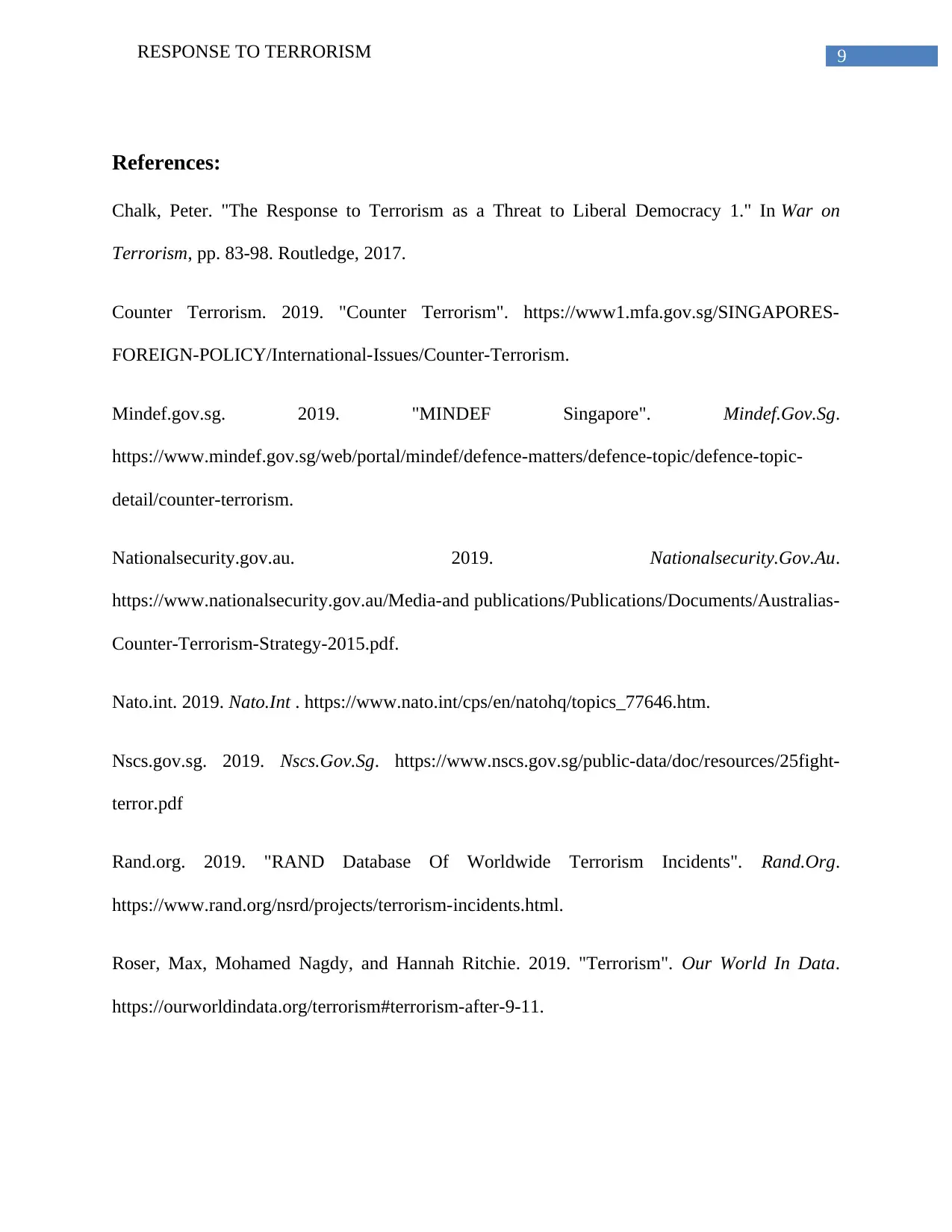
9RESPONSE TO TERRORISM
References:
Chalk, Peter. "The Response to Terrorism as a Threat to Liberal Democracy 1." In War on
Terrorism, pp. 83-98. Routledge, 2017.
Counter Terrorism. 2019. "Counter Terrorism". https://www1.mfa.gov.sg/SINGAPORES-
FOREIGN-POLICY/International-Issues/Counter-Terrorism.
Mindef.gov.sg. 2019. "MINDEF Singapore". Mindef.Gov.Sg.
https://www.mindef.gov.sg/web/portal/mindef/defence-matters/defence-topic/defence-topic-
detail/counter-terrorism.
Nationalsecurity.gov.au. 2019. Nationalsecurity.Gov.Au.
https://www.nationalsecurity.gov.au/Media-and publications/Publications/Documents/Australias-
Counter-Terrorism-Strategy-2015.pdf.
Nato.int. 2019. Nato.Int . https://www.nato.int/cps/en/natohq/topics_77646.htm.
Nscs.gov.sg. 2019. Nscs.Gov.Sg. https://www.nscs.gov.sg/public-data/doc/resources/25fight-
terror.pdf
Rand.org. 2019. "RAND Database Of Worldwide Terrorism Incidents". Rand.Org.
https://www.rand.org/nsrd/projects/terrorism-incidents.html.
Roser, Max, Mohamed Nagdy, and Hannah Ritchie. 2019. "Terrorism". Our World In Data.
https://ourworldindata.org/terrorism#terrorism-after-9-11.
References:
Chalk, Peter. "The Response to Terrorism as a Threat to Liberal Democracy 1." In War on
Terrorism, pp. 83-98. Routledge, 2017.
Counter Terrorism. 2019. "Counter Terrorism". https://www1.mfa.gov.sg/SINGAPORES-
FOREIGN-POLICY/International-Issues/Counter-Terrorism.
Mindef.gov.sg. 2019. "MINDEF Singapore". Mindef.Gov.Sg.
https://www.mindef.gov.sg/web/portal/mindef/defence-matters/defence-topic/defence-topic-
detail/counter-terrorism.
Nationalsecurity.gov.au. 2019. Nationalsecurity.Gov.Au.
https://www.nationalsecurity.gov.au/Media-and publications/Publications/Documents/Australias-
Counter-Terrorism-Strategy-2015.pdf.
Nato.int. 2019. Nato.Int . https://www.nato.int/cps/en/natohq/topics_77646.htm.
Nscs.gov.sg. 2019. Nscs.Gov.Sg. https://www.nscs.gov.sg/public-data/doc/resources/25fight-
terror.pdf
Rand.org. 2019. "RAND Database Of Worldwide Terrorism Incidents". Rand.Org.
https://www.rand.org/nsrd/projects/terrorism-incidents.html.
Roser, Max, Mohamed Nagdy, and Hannah Ritchie. 2019. "Terrorism". Our World In Data.
https://ourworldindata.org/terrorism#terrorism-after-9-11.
⊘ This is a preview!⊘
Do you want full access?
Subscribe today to unlock all pages.

Trusted by 1+ million students worldwide
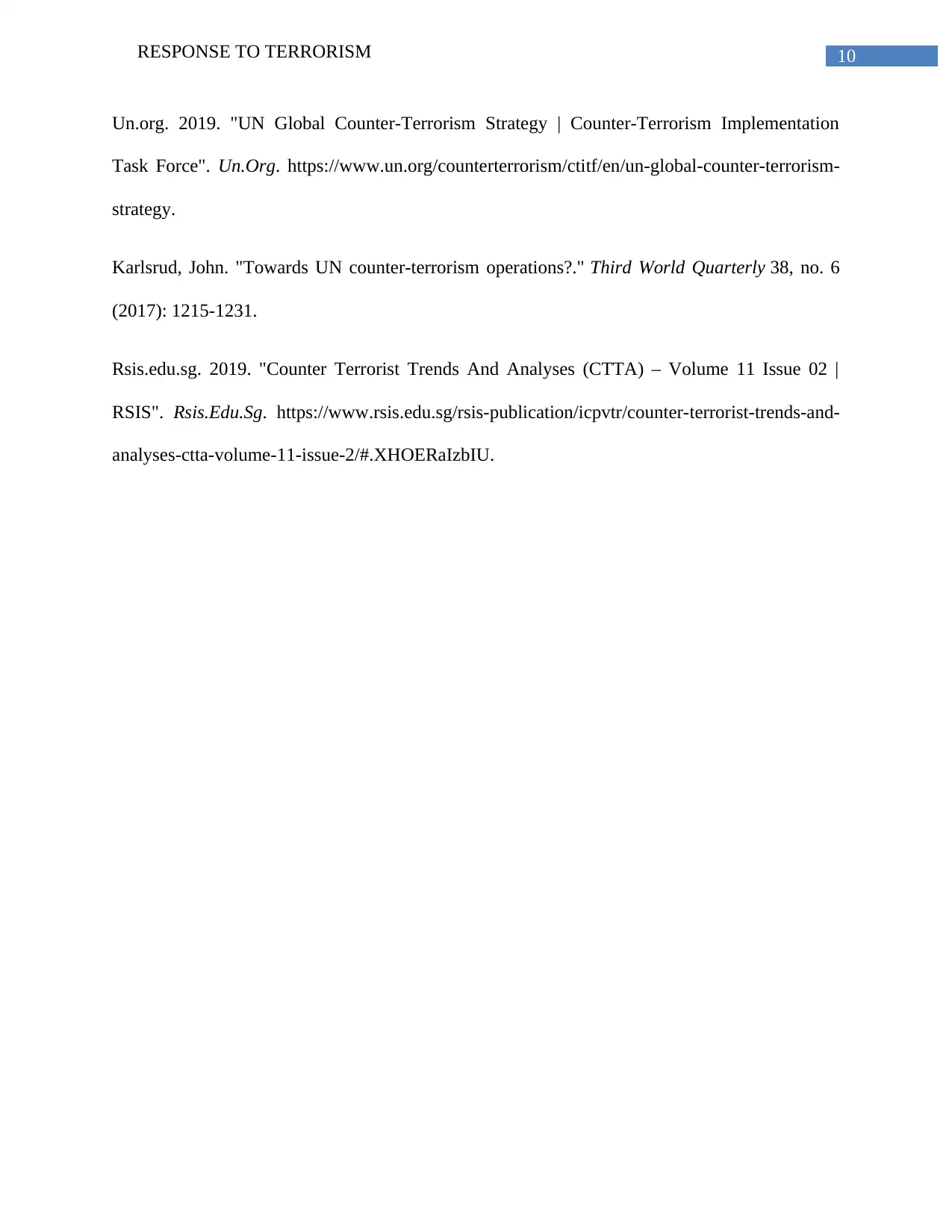
10RESPONSE TO TERRORISM
Un.org. 2019. "UN Global Counter-Terrorism Strategy | Counter-Terrorism Implementation
Task Force". Un.Org. https://www.un.org/counterterrorism/ctitf/en/un-global-counter-terrorism-
strategy.
Karlsrud, John. "Towards UN counter-terrorism operations?." Third World Quarterly 38, no. 6
(2017): 1215-1231.
Rsis.edu.sg. 2019. "Counter Terrorist Trends And Analyses (CTTA) – Volume 11 Issue 02 |
RSIS". Rsis.Edu.Sg. https://www.rsis.edu.sg/rsis-publication/icpvtr/counter-terrorist-trends-and-
analyses-ctta-volume-11-issue-2/#.XHOERaIzbIU.
Un.org. 2019. "UN Global Counter-Terrorism Strategy | Counter-Terrorism Implementation
Task Force". Un.Org. https://www.un.org/counterterrorism/ctitf/en/un-global-counter-terrorism-
strategy.
Karlsrud, John. "Towards UN counter-terrorism operations?." Third World Quarterly 38, no. 6
(2017): 1215-1231.
Rsis.edu.sg. 2019. "Counter Terrorist Trends And Analyses (CTTA) – Volume 11 Issue 02 |
RSIS". Rsis.Edu.Sg. https://www.rsis.edu.sg/rsis-publication/icpvtr/counter-terrorist-trends-and-
analyses-ctta-volume-11-issue-2/#.XHOERaIzbIU.
1 out of 10